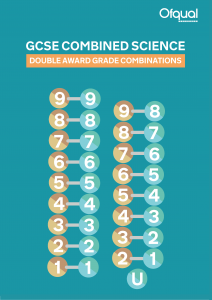Over the last few years teachers and students in England have seen significant changes to A Levels and GCSEs in the sciences as reformed qualifications have been phased in.
The cohort receiving GCSE awards on Thursday 23rd will be the first to have studied the new biology and combined science GCSEs, graded on a 9 to 1 scale.

The new 17 point combined scale
This is the second year that A Level students have been awarded practical endorsements as part of reformed, linear A Levels, decoupled from AS qualifications. The grading system for A Levels remains the same , A* – E, with the addition of a Practical Endorsement pass awarded for successfully demonstrating practical skills in 12 practical activities assessed against Common Practical Assessment Criteria.
During development of reformed GCSEs and A Levels, the Department for Education aimed to design qualifications that were more challenging for students, and better prepared them for 21st century work and study.
For more information on GCSE reforms ahead of this week’s GCSE results, including the new 17 point combined science grade scale, please see RSB’s GCSE reform briefing note, and the Department for Education’s short video explaining the changes.
The new 9 to 1 grading scale aims to better differentiate between the highest performing students and distinguishes clearly between the old and new qualification. Grade 9 is the highest grade and will be awarded to fewer students than the old A*
The old and new GCSE grading scales do not directly compare (see figure 1), however a grade 4 or above marks a similar achievement to the old Grade C or above. This is considered a “standard pass” for all subjects. Grade 5 and above will be considered a “strong pass”, and in English and maths attainment this will be used as the headline school performance measure; a benchmark comparable with higher performing education systems.
Ofqual has also published a blog describing what to expect on GCSE results day, and the addition of a 3-3 grade for higher tier combined sciences awards this year.
In addition to reforming current qualifications, development of new 16 -19 T Level qualifications is underway. These technical routes will prepare students to progress on to a skilled occupation, higher or degree level apprenticeship, or higher level technical education.
Soon, awarding bodies will be invited to tender for the first technical qualifications due for first teaching in 2020 and in the biosciences we expect to respond to consultations on outline content developed by T Level panels in health and science and agriculture, environment and animal care pathways.
These reforms and developments raised a lot of questions for schools, further and higher education providers, employers and parents, as well as the students and teachers themselves – what does a grade 6 in biology GCSE mean? How is that different from a combined science 6-5? Does the new practical endorsement prepare students with the practical skills they need in their chosen next step in education or work?
Will students on T Level routes be equally well prepared by their GCSEs? Will those who complete T Levels be able to transfer to A Levels, or academic routes beyond, and vice versa?

The new reforms raised a number of questions, such as how the previous GCSE grades compare to the new scale
To help capture the answer to some of these questions the Royal Society of Biology has been publishing briefing notes and responding to consultations, contributing to T Level panel discussions, and gathering evidence on the impact of education reform through a series of surveys of undergraduate biology students on their own perceptions of their preparedness for entry into tertiary education.
In the first year of RSB’s longitudinal study, 2016/17, we obtained baseline data from students who had studied pre-reform A Levels. This year we have collected data from the first cohort of students to study the new qualifications.
By 2020 the first students to complete the new GCSE specifications will have progressed through the reformed A Levels and will be entering undergraduate courses, further education, or the workforce.
As we move through this cycle, evidence collected from students in our longitudinal study and similar research conducted by other stakeholders will be important in supporting schools and universities during the transition, informing future curriculum development and the work of our own curriculum committee, and in contributing to the development of T Levels.
RSB has published news stories for Scottish and A Level results days this month. Keep an eye out for our GCSE results news story, to be published on 23rd August, and updates as our curriculum framework develops.

